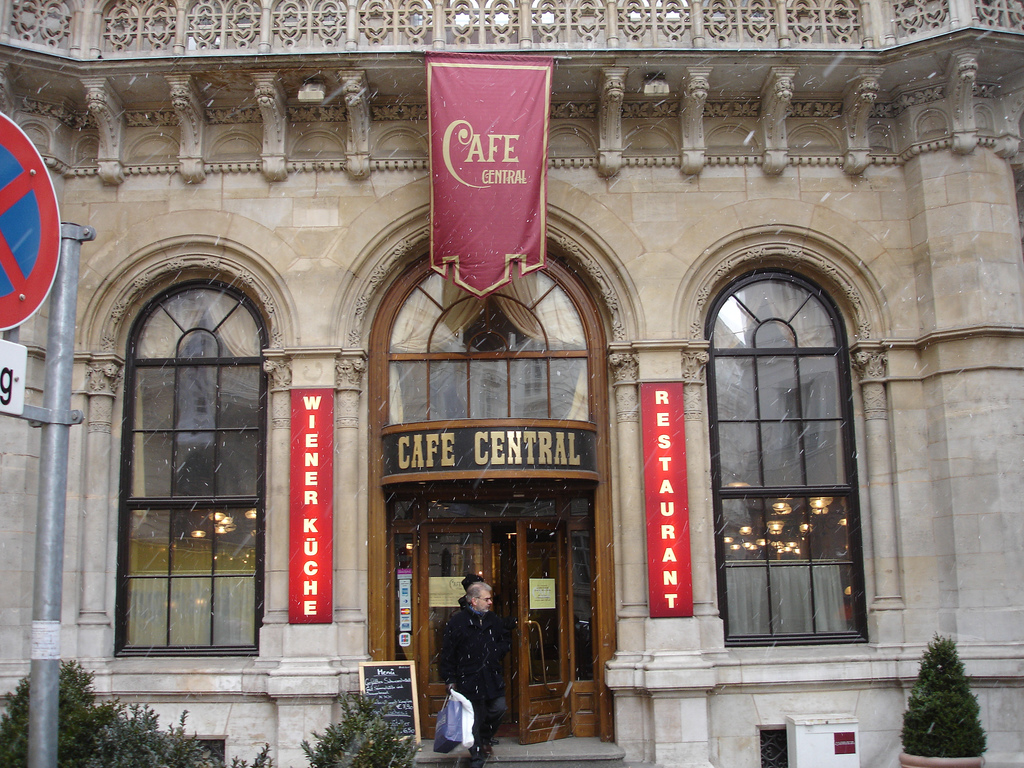Chinese Cafe Management and French Cafe Culture

If Italian coffee culture is richer in connotation, because it covers both coffee culture and cafe culture, and coffee culture is the main one, then French coffee culture actually refers to French cafe culture.
The situation of French cafes is a bit complicated. Its development has gone through a long process. It has not only been neglected when it first appeared, but also miraculously played an important role in the transformation of social economy and culture-from the vigorous bourgeois revolution in the 18th century to the peak of literary and artistic creation in the 19th century, to the endless artistic schools and masters of humanities in the 20th world. It can be said that there is no such cultural incubator as cafes. There would be none of this.
Therefore, Chinese teahouses and French cafes are not the same thing. Tea houses have not played an important role in the historical process of China. They are only a kind of commercial form. They have never been as glorious and beautiful as French cafes, which makes people feel old-fashioned if they don't go there.
1. Bad luck cafe pioneer days
In the 1640s, the first café appeared in Marseille, France, but business was not very good, and it almost closed several times. The French were foolish enough at the time to be prejudiced against coffee, believing it to induce stroke, impotence, emaciation, and so on, and two doctors of Aix-cadets argued that "for various reasons we must conclude that coffee is harmful to the greater part of the population of Marseilles."
At this time, many cafes income ordinary citizens as the main customers. Many poor people come to cafes to save money on lamp oil, heating coal and newspaper money. They were originally playing cards and chatting in noisy taverns. When coffee shops appeared, their activities gradually shifted.
Salons were places for aristocrats to socialize and love in feudal times. In the late 17th century, urban bourgeoisie gradually emerged. Coffee houses provided places for literati to hold public salons. Just as salons needed themes, coffee houses also had many classifications-"gentlemen's coffee house","painter's coffee house","journalist's coffee house","music coffee house","college coffee house","councilor's coffee house", actor's coffee house ", Psychologist's Cafe is a place where people exchange ideas and share insights.
2. Good times are coming.
By the late 18th century, cafes played an important role in the French Revolution. Aristocrats and royalists gathered in cafes to spread rumors, and Robespierre, Danton and Marat, the three leaders of the French Revolution, talked to other revolutionaries about the ideals of social change and described their own blueprints. In 1789,"Down with the tyrant!" Destroy the Bastille!" The horn was also blown from the cafe. Montesquieu once said,"If I were the monarch of this country, I would close the cafés, because they are easy to get people's heads hot." I'd rather see them drunk in taverns, at least they wouldn't do anything harmful to themselves, but the craze coffee gives them makes them dangerous for the future of the country." The need to be beaten is usually something important enough to cause fear, which shows the social status of cafes at the time.
Especially worth mentioning here is Prokop Cafe.
It was the first café in Paris, built in 1686 by the Italian Procpio, and its interior was modeled after the Palace of Versailles. It was also a lucky café because shortly after it opened, the Comédie Française moved across the street from it. From the first day of the theater, the cafe was packed with actors, writers and audiences. The cafe started flying!
Every time I talk about Proctor's, I get a little sad. Who doesn't start from a miserable business when opening a coffee shop in Beijing? Even the owner and the owner of the carving time were maintained by one person going out to work and one person looking after the store at the beginning. Proctor was born to be a magical cafe.
Since Procopio's son took over the management, it has become a place where thinkers and revolutionaries often go-Voltaire, Rousseau, the 18th century European Enlightenment thinkers, and Diderot, the author of the world's first encyclopedia, wrote works affecting the revolution and social development process in Europe and America. The red, white and blue tricolour hat symbolized during the Great Revolution also appeared here for the first time. Napoleon is said to have visited this cafe before his rise and left his military hat because he owed money for drinking coffee.
The coffee shop is so reactionary, but the government still doesn't confiscate it. This coffee shop is really lucky to the extreme.
3. After the storm, talk about the wind and moon, French culture is wonderful because of the cafe!
I wonder what will happen to culture without coffee shops.
On the one hand, cafes are places where the lower classes play cards and drink for entertainment. It's really a waste of heaven. Only when people with dreams enter them, dance and write, will cafes have souls, shine and shine in history.
On the other hand, only when people with dreams come together to share ideas and exchange skills can art bloom, ideas flourish and the world flourish.
In the post-Revolution peacetime, countless novelists, playwrights, poets, painters, and musicians made the café their "second home."
Among these people, there are the composer Chabrier, the poet Verlaine, the painter Monet, the writer Hemingway's footprints, the thinkers Sartre, Beauvoir's argument voice, even the lifelong down-and-out Van Gogh once lived in the attic of a cafe, leaving behind the world-famous "Cafe at Night," he said: "I hope to hold a personal exhibition in this cafe one day."
In the Cafe de Marge on the left bank of the Seine, a group of surrealist writers and painters gave birth here in the 1920s, violently colliding with literary and artistic opinions, and finally created a "De Marge Prize for Literature" named after this cafe, which continues to this day.
The owners of these cafes are mostly art lovers, and they adopt an tolerant attitude towards artists who are not yet successful. For example, Li Biyong of Yuanting Cafe is willing to accept artists who have no money. Speaking of this, I suddenly remembered Beijing's startup incubator garage coffee. When it first opened, there was a startup team who stayed in the store for a whole month, never ordering orders. The store manager was crazy, because at that time, the cafe's own business was not good. The boss said lightly: "It doesn't matter, let them stay." The next month the team got the investment in the garage. What I want to say is that coffee shops are business, and of course they have to talk about profits, but sometimes a trace of compassion from the boss and a little tolerance will indirectly help young people achieve higher achievements, thus contributing to this era and to this society.
When we marvel at the achievements of French literature and art that began in the second half of the nineteenth century, let us not forget the role played by the café, let us not forget the café owners who put aside their interests. Artists are great, but the café owners who support artists, provide venues for artists, and provide opportunities for exchange of ideas are equally great! Austrian writer Zweig said in "When the human stars shine":"Destiny, another god in this world, is only willing to lift up the brave with warm arms and send them to the paradise of heroes." "In fact, it is not only fate that sends brave people to heroes, but also countless cafe owners who are willing to pay and understand tolerance. Behind everyone's success, there are many people's concerns. Let's not forget these cafes.
4. In the age of mediocrity, what else can cafes do?
In today's era, for the French, coffee means an elegant attitude towards life and romantic atmosphere. In this country, drinking coffee while enjoying the modern girls in fashion magazines can make a person very fashionable, so the French never care about the taste of coffee, but care about the atmosphere when drinking coffee.
France is the most common open-air cafes, there are also many cafes with open-air seating-almost all chairs facing the road, this is the road as a stage, the passers-by as actors. Guests bask in the sun, sip coffee, listen to the music of the street musician, and enjoy the hugs, kisses,
As a former cafe owner, I find this quite pleasing-because French cafes set prices for coffee according to seats, customers sit in different seats and drink coffee for different money, bar seats are the cheapest, and they don't pay service fees, and outdoor seats are the most expensive-think about street artists, couples kissing... these extras are not paid, but this can increase revenue as an added value of coffee.
Of course, the current cafe is no longer comparable to the original grand occasion. It is said that 4000 cafes go bankrupt every year in France. People prefer bars or other meeting places. The pace of life is much faster. People don't have so much time to chat in cafes. One third of French people say they have never been to a cafe.
It's a little sad that the pomp is no longer there.
Important Notice :
前街咖啡 FrontStreet Coffee has moved to new addredd:
FrontStreet Coffee Address: 315,Donghua East Road,GuangZhou
Tel:020 38364473
- Prev

Kenyan coffee cowpea hand pot making experience coffee hand brewing process
Kenya round beans: 13 grams, cup baking degree (belongs to 1 burst beans); 93 degrees water temperature (cooling by changing pots, cold water to hot water loss is 2%); powder-to-water ratio is 1VR 16.66; after grinding, it is corrected by No. 20 screen. Water consumption: conversion according to the ratio of gouache: 13g x 16.66mm 216.58g; change to 93 degrees hot water: 216.58 X 0.98g (1-0.02g) = 212.25 g, the total water is 212.25 g, in
- Next

How to drink coffee is the healthiest and most suitable time to drink coffee
The mission of scientists is to constantly explore the mysteries of nature. Thanks to science, we know why people go on a drinking spree and how to wash their hands more cleanly. Recently, scientists have made unremitting efforts to discover why drinking coffee from a white cup feels more bitter, while drinking coffee from a glass cup feels sweeter. And as experimental rats, we are eager to know about coffee.
Related
- Beginners will see the "Coffee pull flower" guide!
- What is the difference between ice blog purified milk and ordinary milk coffee?
- Why is the Philippines the largest producer of crops in Liberia?
- For coffee extraction, should the fine powder be retained?
- How does extracted espresso fill pressed powder? How much strength does it take to press the powder?
- How to make jasmine cold extract coffee? Is the jasmine + latte good?
- Will this little toy really make the coffee taste better? How does Lily Drip affect coffee extraction?
- Will the action of slapping the filter cup also affect coffee extraction?
- What's the difference between powder-to-water ratio and powder-to-liquid ratio?
- What is the Ethiopian local species? What does it have to do with Heirloom native species?

